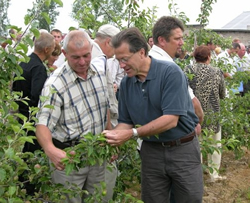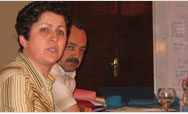Sustainable Agriculture
Agriculture and other natural resource-based enterprises are the foundation for economic growth in many developing countries. Of the 11 percent of the world's land surface that is suitable for agriculture, 38 percent has become degraded by poor natural resource management practices. With no significant room to expand areas of cultivation, good stewardship of the available land is necessary to maintain agricultural productivity, ensure economic growth, protect biodiversity, maintain sufficient amounts of clean water and meet the increasing food demands of a growing global population.
 |
| Adina uses drip irrigation for her vegetable garden in Addis Ababa, Ethiopia. A USAID program provides vulnerable women like Adina with the tools to plant gardens to feed their families and increase household income. - Read more about Adina |
Sustainable agriculture integrates environmental health, economic viability and social equity to ensure long-term productivity of natural resources and improved livelihoods. It helps reduce the risks in developing countries of complex problems like climate change and water scarcity – important because agriculture constitutes approximately 70% of water consumption in the developing world, increasingly competing with demand for domestic, industrial and ecosystem services.
USAID’s approach
USAID considers the impact of agricultural production and processing on communities and ecosystems and promotes practices that:
- Improve soil quality, while reducing erosion, salinization and other forms of degradation to achieve greater resilience to drought, better fertilizer efficiency, and reduced greenhouse gas emissions
- Minimize the use of pesticides and herbicides by applying integrated pest management, crop rotation and crop diversification
- Employ environmental management systems to ensure proper treatment of solid waste, manure and waste water
- Ensure the safe storage, application and disposal of agricultural chemicals
- Maintain habitats to support wildlife and conserve biodiversity
|
USAID supports agricultural techniques that are ecologically sound, economically viable, and socially responsible. Increasingly, activities focus on environmental sustainability across agricultural supply chains and multi-use landscapes. Sustainable agriculture in the context of development helps partner countries achieve production efficiency, protect ecosystem functions, enhance resilience to climate change, ensure healthy communities, and satisfy basic needs.
 |
| A volunteer with a USAID farm program, John Balles introduces integrated pest management to the members of a Grodno, Belarus fruit growers group. Growers saw increased production after support from USAID volunteers. |
Some examples of USAID achievements in sustainable agriculture include:
The use of environmentally sustainable practices in agriculture can contribute to both poverty alleviation and food security. By integrating sustainable resource management practices into agricultural programs, farmers and rural communities can increase their agricultural productivity and competitiveness while also protecting the environment. USAID’s successes show that developing countries can build efficient and competitive economies without destroying the productive agricultural base on which they depend.
Back to Top ^
|




